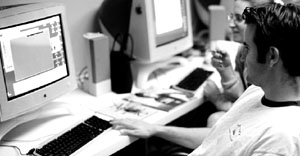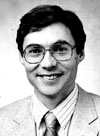By Omar Villafranca staff reporter Graphic design students may soon find themselves attending class in the other half of the Moudy Building. The graphic design department has requested a move from the College of Fine Arts to the College of Communication. "It's bad news," said Stephanie Jones, a senior graphic design major. "I think we're going to lose the whole art aspect of it. I wouldn't have gotten into this major if it wasn't in the fine arts department."
"What we will gain (if the move takes place) administratively, and, in some ways, academically is we will be aligned with disciplines with similar objectives," Glaser said. "Advertising/public relations and radio-TV-film are notable. I think that's going to facilitate interaction among students." Glaser, who is half of the full-time staff in the graphic design program, said if the move is approved, he expects it to happen gradually. "What we want to do most immediately is to get this administrative realignment dealt with," he said. The current College of Fine Arts and Communication is being divided into the College of Communication and the College of Fine Arts. David Whillock, present dean of the College of Fine Arts and Communication, said the request was sent to himself and Provost William Koehler. "We have taken steps (with) the proposal, but no decisions have been made," Whillock said. Whillock said no date has been set as to when a decision will been made. This sort of process takes time and thorough evaluation, he added. John Lucius, a senior graphic design major, said he is afraid there will be less emphasis on the art and creative aspect of graphic design. "Taking it (to the College of Communication) would take away the whole art process," Lucius said. "The only good thing I see about it is that you can take different classes over there." Glaser said students do not need to worry about losing the artistic background. They will still take the required studio art classes, maybe just not as many credit hours, he added. Both Jones and Lucius said the move to the College of Communication would put more emphasis on the computer work than on the creative- thinking process. "I think they are making it easier to become a graphic artist," Jones said. "Everyone thinks the computer does the whole job, but there are a lot of hand skills needed."
Omar Villafranca
By Victor Drabicky staff reporter Many students leave bars and parties every night and then try and drive drunk, said Jessie Korth, a junior political science major. The drinking and driving problem around campus has led some students to begin work on a program that would offer rides to students that have had too much to drink. "We are still researching the idea, but we are looking into a program that would involve either Enterprise Rent-A-Car or the national Group Rides and Designated Drivers program," senior marketing major Carlo Capua said. A safe-rides program was put into effect on the University of Arkansas campus two semesters ago. Since its inception, more than 6,000 students have used the program, and DWIs on campus were cut by almost 50 percent, said Mary-Alice Serafina, director of the health center at U of A. Serafina said she was pleased with the program's success. "The safe-ride program was widely accepted by the students," she said. "The company we used had cabs, vans and even a limo in order to encourage students to use them. The vans allowed students to come home in groups, while the limo helped to keep students from being embarrassed for being in a situation they could not handle." However, the safe-ride program at U of A only lasted two semesters. "Unfortunately, we had some trouble with the cab company we used," Serafina said. "We are currently in negotiations with other companies so that we can get the program up and running again." Despite discouraging news from programs such as the one at the University of Arkansas, Capua said he is confident that a safe-ride program would work at TCU. "We are doing research to make sure that our program is done the right way," he said. "A lot depends on whether or not a program is feasible logistically, cost efficient and TCU's liability." Vice Chancellor for Student Affairs Don Mills said although he would like to see a program implemented, many factors would determine whether TCU adopted the program. "We would definitely need to weigh out whether the liability and cost would be efficient," Mills said. "We would need to decide whether the money would be better spent on a program like this, or on a program like financial aid. Either way, it needs to be a well-thought-out program." Director of Alcohol and Drug Education Angie Taylor said she would like to see students take some initiative on the issue. "TCU is already highly ranked by a national organization for having a good comprehensive program, but I would like to see us do even better," she said.
Victor Drabicky
By Matt Stiver Assistant Campus Editor A new state of matter discovered by a physicist may hold the potential to produce benefits for mankind. Carl Wieman, a distinguished professor of physics at the University of Colorado and a Phi Beta Kappa visiting scholar, will address the basics of the new state of matter and potential applications at 7:30 p.m. Thursday in Sid W. Richardson Building Lecture Hall 2. Admission will be free. Wieman and his assistants were able to cool atoms of the element Rubidium to one millionth of a degree Kelvin above absolute zero. The atoms then changed to a new state of matter, neither a liquid nor a gas, but possessing qualities of lasers.
Curtis Bradley, an assistant professor of physics, said the Bose-Einstein condensates have the potential for useful applications. "Back in the early 1900s, when scientists first learned about semi-conductor technology, they really didn't know what to do with it," Bradley said. "One application would be atom-litography. This process takes these special atoms and creates structures with them on surfaces." Bradley also said the technology could be used for more precise measurements and for clocks more accurate than current atomic clocks. Ross Acker, a senior physics major, said he is excited about Wieman's visit. "Wieman is concerned about science education, and I've been considering going into that field after I graduate in May," Acker said. "Science and math education in the United States is below average compared to countries in Europe and Asia." Doug Ingram, an instructor of physics and astronomy, said he is not requiring his students to attend the lecture but has encouraged attendance. "This is the kind of fundamental research that is exciting because you learn something new and because you don't know what we could learn," Ingram said. On Friday, Weiman will meet with professors in the science and mathematics departments about the state of science education at TCU. Bradley said meeting participants will attempt to discover how TCU can better prepare graduate students for careers and strengthen undergraduate programs. Wieman is a fellow of the Joint Institute for Laboratory Astrophysics. He is also a member of the National Academy of Sciences and the American Academy of Arts and Sciences.
Matt Stiver
By Kasey Feldman staff reporter Students want to come to America so badly that many bend the rules to get here, said John Singleton, director of International Student Services. According to immigration laws, students must prove they have enough funds to pay for school and living expenses before they are allowed to come to the United States. One student, who asked not to be identified for fear she may be deported, said her family did not have the money. To "prove" she could afford to study in the United States, her family borrowed money from a friend, put it in a savings account, received the bank statement and then gave the money back. She had to get a job on campus to support herself. Singleton said international students should not need to work once they get here if they list family members in the United States and their assets on the I-20, the form they must fill out to prove financial ability. However, the family members listed may not actually contribute any money to help the student. About 60 percent of international students work on campus, and Singleton said most need to work for financial reasons.
"If they show that they have the money, then we feel some of that is their own responsibility," Singleton said "It's not too difficult to figure out which ones may be stretching it." He also said if the university is certain that students have misrepresented themselves, they will deny the students entry to TCU. Singleton said clues such as large deposits of money in a prospective student's account just before the bank statement was issued show that the student may not actually have the money he or she claims to have. Students are willing to lie about their finances to study here because of the value of an education, Singleton said. Some students cannot get an education in their own country. For others, the value of an American education is much greater than the value of the education they could get at home. For some, Singleton said, working on campus is not a necessity but increases the value of their education here. He said students who do not need the money may get a job to improve their knowledge of the English language. Yuriko Hosogaya, a sophomore social work major, said she works because she wants to meet people. Marilyn Porter, human resources data control specialist, said about 14 percent of students working on campus are international students. Singleton said international students make up about 5 percent of the student body but, unlike American students, cannot work off campus. However, Porter said not all student jobs are filled.
Kasey Feldman |
| The TCU Daily Skiff © 1998, 1999 Credits |
 Lewis Glaser, an associate professor of
graphic design, said the proposed move is still in the theoretical stages.
Glaser said the graphic design program belongs in the College of Communication
because it will help graphic design students in the real world.
Lewis Glaser, an associate professor of
graphic design, said the proposed move is still in the theoretical stages.
Glaser said the graphic design program belongs in the College of Communication
because it will help graphic design students in the real world. The new matter is called Bose-Einstein condensates. The
atoms do not scatter as those of a gas but can be controlled and stacked
on top of one another. This phase transition was predicted by Albert Einstein.
The new matter is called Bose-Einstein condensates. The
atoms do not scatter as those of a gas but can be controlled and stacked
on top of one another. This phase transition was predicted by Albert Einstein. Singleton said TCU meets the legal requirement
to check prospective international students' finances but is not as strict
as it could be.
Singleton said TCU meets the legal requirement
to check prospective international students' finances but is not as strict
as it could be.